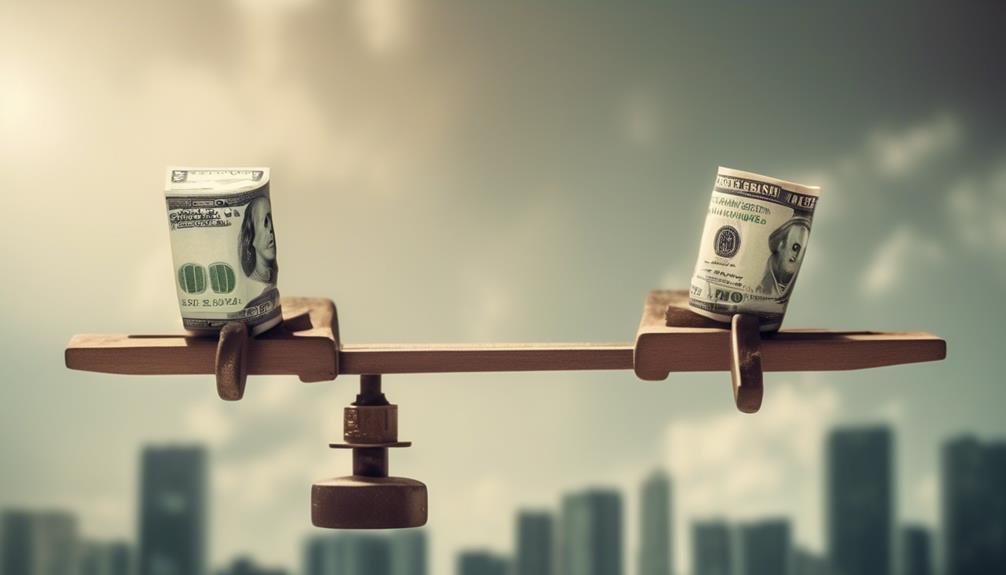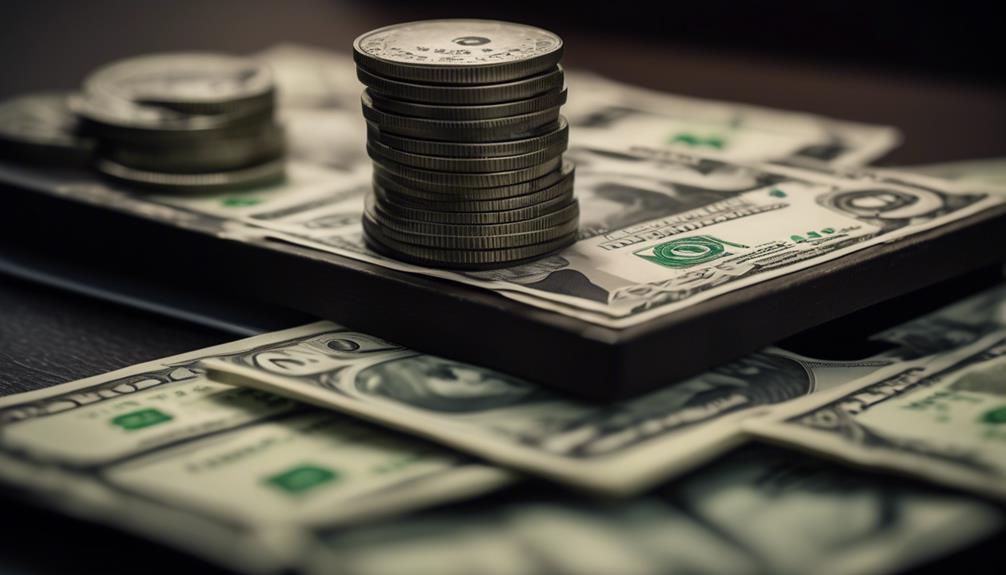The exchange rate between the Nigerian Naira and the US Dollar is a topic of great interest and concern for individuals and businesses alike. The black market, in particular, has a significant impact on this exchange rate, with rates often deviating from the official ones. Today, we explore the current state of the Naira to Dollar exchange rate in the black market and delve into the factors that contribute to its volatility. Additionally, we will discuss the implications of this exchange rate on import and export businesses, as well as strategies to mitigate associated risks. Stay tuned to gain valuable insights into this ever-evolving economic landscape.
Key Takeaways
- The Naira to Dollar exchange rate in the black market is influenced by factors such as historical trends, government policies, foreign exchange controls, economic stability, and policies that encourage foreign investment.
- The Naira has experienced depreciation over the years due to inflation and political instability, with significant volatility in the past few decades.
- The black market rate diverges from the official exchange rate due to limited supply and high demand, and it serves as an avenue for accessing foreign currency when official channels are limited.
- Accessing current black market rates can be done through online platforms, financial news websites, local financial institutions, and foreign exchange bureaus. It is important to be aware of these rates for financial transactions involving foreign currency.
Factors Influencing the Naira to Dollar Exchange Rate

The Naira to Dollar exchange rate is influenced by various factors that play a significant role in determining its value. One of the key factors that affect this exchange rate is historical trends. Historical data on the performance of the Naira against the Dollar provides insights into the past patterns and helps in predicting future trends. By analyzing these trends, investors and traders can make informed decisions about buying or selling currencies.
Another crucial factor that influences the Naira to Dollar exchange rate is government policies. The government's economic policies, such as fiscal and monetary policies, can have a direct impact on the exchange rate. For instance, if the government implements policies that promote economic stability, it can lead to an increase in the value of the Naira against the Dollar. On the other hand, if the government adopts policies that create economic uncertainty, it can result in a depreciation of the Naira.
Government policies related to foreign exchange controls and regulations also impact the exchange rate. For instance, restrictions on the purchase or sale of foreign currencies can limit the availability of Dollars in the market, leading to an increase in its value. Similarly, policies that encourage foreign investment can attract foreign capital, which can strengthen the Naira.
Historical Trends of the Naira to Dollar Exchange Rate
Throughout the years, the Naira to Dollar exchange rate has experienced various fluctuations, influenced by a range of economic and political factors. Historical data reveals that the Naira has experienced significant currency fluctuation against the Dollar, reflecting the changing economic landscape in Nigeria.
In the 1960s, shortly after Nigeria gained independence, the Naira was at par with the US Dollar. However, over the years, due to factors such as inflation, political instability, and external economic shocks, the Naira has depreciated against the Dollar. In the 1980s, for example, Nigeria experienced an economic downturn, leading to a devaluation of the Naira. This trend continued into the 1990s and early 2000s, with the Naira witnessing further depreciation.
During this period, the Naira to Dollar exchange rate experienced significant volatility, with occasional periods of stability. The Nigerian government, at times, implemented measures such as currency controls and pegging the exchange rate to manage the fluctuations. However, these interventions often proved unsustainable, and the Naira continued to depreciate.
In recent years, the Naira has faced additional challenges, including falling oil prices, which is Nigeria's main source of revenue. This has put further pressure on the Naira, leading to a widening gap between the official exchange rate and the parallel market rate.
Understanding the historical trends of the Naira to Dollar exchange rate is crucial for investors and policymakers, as it provides insights into the economic stability and competitiveness of Nigeria. By analyzing historical data and the factors influencing currency fluctuation, stakeholders can make informed decisions to mitigate risks and promote economic growth.
Understanding the Black Market and Its Impact on Currency Rates

Understanding the role of the black market and its impact on currency rates is essential for analyzing the complexities of exchange rate fluctuations. The black market refers to the illegal or unofficial market where currencies are traded outside of the official channels. In the case of the Naira to Dollar exchange rate in Nigeria, the black market plays a significant role in determining the actual value of the currency.
Black market dynamics can have a profound impact on currency stability. When there is a high demand for a particular currency, such as the US Dollar, and limited supply in the official market, the black market thrives. This can lead to a divergence between the official exchange rate and the black market rate. In Nigeria, for example, the official exchange rate may be set at a certain value, but the black market rate can be significantly higher.
The black market's influence on currency rates can have both positive and negative consequences. On one hand, it provides an avenue for individuals and businesses to access foreign currency when the official channels are limited. This can help to meet the demand for imports and ease pressure on the local currency. On the other hand, a wide gap between the official and black market rates can create instability and distort economic activity.
To address the impact of the black market on currency stability, policymakers often implement measures to reduce the gap between the official and black market rates. This can involve increasing the supply of foreign currency through interventions in the official market or implementing stricter regulations to curb illegal currency trading. However, it is important to strike a balance between curbing illegal activities and providing a conducive environment for legitimate currency trading.
How to Access the Current Naira to Dollar Exchange Rate in the Black Market
Are you wondering how to access the current Naira to Dollar exchange rate in the black market? The black market is an unofficial market where currencies are traded outside of the control of the government. As such, it is important to have access to accurate and up-to-date information about the exchange rates in this market. Fortunately, there are several ways to access the current Naira to Dollar exchange rate in the black market.
One way is to use online platforms that provide real-time information on black market rates. These platforms aggregate data from various sources and provide users with the most accurate and current exchange rates. Some of these platforms even provide historical data, allowing users to track the fluctuations in exchange rates over time.
Another way to access the current Naira to Dollar exchange rate in the black market is through financial news websites. These websites often provide information on the latest black market rates, as well as analysis and insights into the factors driving these rates.
Additionally, some local financial institutions and foreign exchange bureaus also provide information on black market rates. They may have dedicated sections on their websites or provide this information through their customer service channels.
It is important to note that the black market rates are often higher than the official exchange rates set by the government. This is due to factors such as scarcity of foreign currency and the high demand for dollars in the black market. Therefore, it is crucial to be aware of the current black market rates when planning any financial transactions involving foreign currency.
Reasons for the Volatility in the Black Market Exchange Rate

The volatility in the black market exchange rate can be attributed to several factors. One of the major factors is government interventions in the foreign exchange market. The Nigerian government has implemented various policies and measures to control the exchange rate, but these interventions have often had unintended consequences, leading to fluctuations in the black market rate.
Government interventions such as restrictions on access to foreign exchange and the imposition of import controls have limited the supply of dollars in the market. This scarcity of dollars has driven up demand in the black market, causing the exchange rate to rise. Additionally, the inconsistent implementation of these policies has created uncertainty among market participants, further contributing to the volatility.
The impact of the black market exchange rate volatility extends beyond the foreign exchange market itself. Local businesses, particularly those that rely heavily on imported goods or raw materials, are greatly affected. Fluctuations in the exchange rate make it difficult for businesses to plan and budget effectively, as they are unable to accurately predict the cost of imports. This uncertainty can lead to higher costs and reduced profitability, which can ultimately hinder economic growth and development.
To address the volatility in the black market exchange rate, it is crucial for the government to adopt a more transparent and consistent approach to foreign exchange policies. This would help to stabilize the market and provide businesses with the certainty they need to thrive. Additionally, efforts should be made to diversify the economy and reduce dependence on imports, as this would help to mitigate the impact of exchange rate fluctuations on local businesses.
The Role of Government Policies in the Naira to Dollar Exchange Rate
Government policies play a crucial role in determining the Naira to Dollar exchange rate. Regulations imposed by the government can impact the accessibility and availability of foreign currency, thus influencing the exchange rate. Additionally, government policies aimed at achieving economic stability can have an indirect effect on the exchange rate by influencing factors such as inflation and interest rates. Furthermore, foreign policies and international economic relations can also affect the Naira to Dollar exchange rate, as they can impact the flow of foreign investments and trade.
Government Regulations Impact
The impact of government regulations on the Naira to Dollar exchange rate is a significant determinant of its fluctuation in the financial market. Government regulations play a crucial role in maintaining economic stability and influencing the exchange rate. When the government implements policies that promote economic growth and stability, it can have a positive effect on the Naira to Dollar exchange rate. For example, if the government implements reforms that attract foreign investment and improve the country's financial stability, it can lead to an appreciation of the Naira against the Dollar. Conversely, if the government enacts policies that hinder economic growth or create uncertainty, it can have a negative impact on the exchange rate. Therefore, it is important for the government to carefully consider and implement effective regulations that promote a stable and favorable Naira to Dollar exchange rate.
Economic Stability and Exchange
One of the key factors influencing the Naira to Dollar exchange rate is the implementation of government policies aimed at maintaining economic stability and promoting favorable exchange rates. These policies play a crucial role in determining the strength of the Naira against the Dollar and are essential for economic growth and development.
To illustrate the importance of government policies in maintaining economic stability and promoting favorable exchange rates, let's take a look at the table below:
| Government Policy | Impact on Naira to Dollar Exchange Rate |
|---|---|
| Monetary Policy | Influences interest rates and money supply, which can directly affect the exchange rate. |
| Fiscal Policy | Determines government spending and taxation, which can impact the overall economy and exchange rate. |
| Foreign Exchange Reserves | Adequate reserves can help stabilize the currency and maintain a favorable exchange rate. |
| Trade Policies | Regulations on imports and exports can affect the supply and demand for foreign currencies, thus impacting the exchange rate. |
Effects of Foreign Policies
Foreign policies play a significant role in shaping the Naira to Dollar exchange rate, as government actions and decisions regarding international relations can have a direct impact on currency values. The effects of foreign policies on currency rates are influenced by various factors. For instance, when a government implements trade restrictions or imposes tariffs on imports, it can lead to a decrease in the demand for foreign currencies such as the Dollar, resulting in a depreciation of the Naira. Additionally, foreign policies that affect the ease of doing business, investment climate, or political stability can also influence the exchange rate. Investors and traders closely monitor government actions and announcements related to foreign policies to anticipate potential changes in currency values. Therefore, it is essential for governments to carefully consider the effects of their foreign policies on the exchange rate to maintain a stable and competitive economy.
Effects of the Naira to Dollar Exchange Rate on Import and Export Businesses
The fluctuating Naira to Dollar exchange rate significantly impacts the profitability and competitiveness of import and export businesses. The effects of exchange rate fluctuations on these businesses cannot be underestimated. Here are five key effects and strategies for managing currency risk:
- Increased costs: A weaker Naira against the Dollar implies higher costs for importers, as they need more Naira to buy the same amount of goods. This can eat into profit margins and make imported goods more expensive for consumers.
- Reduced competitiveness: A strong Naira, on the other hand, can make exports more expensive for foreign buyers. This reduces the competitiveness of Nigerian products in international markets, potentially leading to a decline in export sales.
- Uncertainty: Exchange rate fluctuations introduce uncertainty into import and export businesses, making it difficult to plan and budget effectively. Businesses may struggle to forecast future costs and revenues, impacting their overall financial stability.
- Cash flow challenges: Import and export businesses often operate on tight margins and rely on consistent cash flows. Exchange rate volatility can disrupt cash flow forecasts, making it difficult to manage expenses, pay suppliers, and meet financial obligations.
- Hedging strategies: To manage currency risk, import and export businesses can employ various hedging strategies. These include entering into forward contracts, using options or futures contracts, and diversifying their supplier or customer base to reduce exposure to a single currency.
Strategies to Mitigate Risks Associated With Black Market Exchange Rates

Strategies to mitigate risks associated with black market exchange rates involve implementing proactive measures to safeguard against potential financial losses. The volatility of black market exchange rates can pose significant challenges for businesses and individuals who rely on foreign currencies. To navigate this uncertain landscape, it is important to consider the following strategies:
- Diversification: Spreading currency holdings across different currencies can help reduce the impact of exchange rate fluctuations. By holding a mix of currencies, businesses can minimize the risk of being solely dependent on a single currency that may be subject to significant devaluation.
- Hedging: Utilizing hedging instruments such as currency futures or options can provide protection against adverse exchange rate movements. These financial instruments allow businesses to lock in a specific exchange rate for future transactions, mitigating the risk of currency devaluation.
- Forward Contracts: Entering into forward contracts with financial institutions can provide businesses with certainty over future exchange rates. These contracts allow businesses to buy or sell currencies at predetermined rates, providing a hedge against potential losses due to exchange rate fluctuations.
- Government Intervention: Monitoring government policies and interventions in the foreign exchange market is crucial. Governments can implement measures to stabilize exchange rates, such as imposing capital controls or intervening directly in the market. By staying informed about government actions, businesses can better anticipate and respond to changes in black market exchange rates.
- Currency Risk Management: Developing a comprehensive currency risk management strategy is essential. This involves regularly monitoring exchange rates, analyzing market trends, and adjusting business strategies accordingly. Businesses should consider working with financial advisors or utilizing risk management tools to effectively manage their exposure to black market exchange rates.
Implementing these strategies can help businesses and individuals navigate the risks associated with black market exchange rates. By proactively managing currency risks, organizations can protect their financial interests and maintain stability in an unpredictable market.
Impact of the Naira to Dollar Exchange Rate on the Nigerian Economy
The exchange rate between the Naira and the Dollar has a significant impact on the Nigerian economy, influencing various sectors and economic indicators. The following are five key ways in which the Naira to Dollar exchange rate affects the Nigerian economy:
- Impact on inflation: A depreciating Naira can lead to higher import costs, which in turn can lead to increased prices of goods and services. This can contribute to inflationary pressures in the economy, making it more difficult for consumers to afford basic necessities.
- Impact on foreign investment: A stable and favorable exchange rate is crucial for attracting foreign investment. When the Naira is weak, it can deter foreign investors as their returns may be eroded when converted back to their home currency. This can hinder economic growth and development in the country.
- Impact on trade balance: The exchange rate affects the competitiveness of Nigerian exports in the international market. A weaker Naira can make Nigerian goods and services relatively cheaper for foreign buyers, leading to an increase in exports. On the other hand, it can make imports more expensive, potentially widening the trade deficit.
- Impact on government finances: The Naira to Dollar exchange rate also affects government revenues and expenditures. A weaker Naira can increase the cost of servicing external debt denominated in foreign currencies, putting pressure on the government's budget. Additionally, it can reduce the value of oil revenues, which are typically earned in Dollars.
- Impact on consumer purchasing power: The exchange rate has a direct impact on the purchasing power of Nigerian consumers. A weaker Naira means that it takes more Naira to purchase the same amount of foreign goods or services. This can reduce the standard of living for ordinary Nigerians, especially those who rely on imported goods.
Future Predictions and Outlook for the Naira to Dollar Exchange Rate in the Black Market

The current exchange rate of the Naira to the Dollar in the black market is a cause for concern for many Nigerians. Various factors such as inflation, economic instability, and government policies have contributed to the depreciation of the Naira. Looking ahead, it is difficult to predict the future exchange rate, but experts suggest that it will largely depend on the government's ability to implement effective economic reforms and stabilize the Nigerian economy.
Current Exchange Rate
The exchange rate for the Naira to Dollar in the black market is a topic of great interest and speculation among investors and individuals alike, as they seek predictions and outlook for the future. The current exchange rate is influenced by various factors affecting currency rates, such as economic stability, political stability, inflation rates, interest rates, and government policies. These factors play a significant role in determining the value of the Naira against the Dollar in the black market. The exchange rate has a direct impact on international trade, as it affects the cost of imports and exports, and can influence the competitiveness of a country's products in the global market. It is important for investors and individuals to stay updated on the current exchange rate as it can affect their financial decisions and investments.
Factors Affecting Exchange Rate
Factors affecting the future predictions and outlook for the Naira to Dollar exchange rate in the black market include economic stability, political stability, inflation rates, interest rates, and government policies. These factors play a crucial role in determining the fluctuations of currency exchange rates. Economic stability, for instance, is essential as it indicates the strength of a country's economy and its ability to attract foreign investors. Political stability also influences exchange rates, as political turmoil can lead to uncertainty and decrease investor confidence. Inflation rates and interest rates affect exchange rates by influencing the purchasing power of a currency and attracting or deterring foreign investments. Additionally, government policies, such as fiscal and monetary policies, can impact exchange rates by affecting the overall economic environment. Understanding these factors is crucial as exchange rate fluctuations can have a significant impact on a country's economic growth and overall financial stability.
Predictions for Future Rate
The future of the Naira to Dollar exchange rate in the black market is subject to various factors and their potential impact on the currency market. Here are some future projections and outlook for the Naira to Dollar exchange rate:
- Economic policies: The implementation of effective economic policies can positively influence the exchange rate.
- Inflation rate: High inflation can lead to a depreciation of the Naira against the Dollar.
- Oil prices: As Nigeria heavily relies on oil exports, fluctuations in oil prices can impact the exchange rate.
- Foreign investments: Increased foreign investments can strengthen the Naira.
- Government interventions: Government actions such as currency controls or devaluation can have a significant impact on the exchange rate.
Given the volatility of currency fluctuations, it is challenging to predict the exact future rate. However, monitoring these factors can provide insight into potential changes in the Naira to Dollar exchange rate in the black market.
Frequently Asked Questions
What Is the Official Exchange Rate of the Naira to Dollar?
The official exchange rate of the naira to the dollar is a significant factor that affects the average citizens' economic well-being. It determines the cost of imported goods, impacts foreign investments, and influences the overall stability of the economy. Keeping a close eye on the official exchange rate is crucial for individuals and businesses alike, as it helps them make informed decisions and adapt to changes in the global market. Innovation in financial policies and strategies can play a vital role in managing the official exchange rate effectively.
How Does the Naira to Dollar Exchange Rate in the Black Market Affect the Average Nigerian Citizens?
The naira to dollar exchange rate in the black market has significant economic implications for the average Nigerian citizen. Fluctuations in this exchange rate can directly impact the purchasing power of individuals, as imported goods become more expensive. This can lead to a decrease in the standard of living and financial stability for many Nigerians. Additionally, a volatile black market exchange rate can hinder foreign investments and trade, further hindering economic growth and development in the country.
Are There Any Legal Consequences for Engaging in Black Market Currency Exchange?
Engaging in black market currency exchange carries significant legal implications and risks. The practice is considered illegal in many countries, including Nigeria. Individuals involved in such activities may face severe penalties, including fines and imprisonment. Moreover, participating in the black market exposes individuals to various risks, such as counterfeit currency, theft, and fraud. It is important for individuals to adhere to legal channels for currency exchange to ensure compliance with the law and minimize potential consequences.
How Do Fluctuations in the Naira to Dollar Exchange Rate Impact the Prices of Imported Goods?
Fluctuations in the naira to dollar exchange rate can have a significant impact on the prices of imported goods. When the naira depreciates against the dollar, the cost of importing goods increases, leading to higher prices for consumers. This can contribute to inflationary pressures in the economy. Additionally, it may negatively affect local industries that rely on imported raw materials or intermediate goods, as their production costs rise. Therefore, maintaining a stable exchange rate is crucial for mitigating these effects and promoting economic growth.
What Measures Has the Nigerian Government Taken to Stabilize the Naira to Dollar Exchange Rate?
The Nigerian government has implemented various measures to stabilize the naira to dollar exchange rate. These measures include the introduction of the Investors and Exporters (I&E) window, which allows for more flexible exchange rates. Additionally, the Central Bank of Nigeria has intervened in the foreign exchange market through regular auctions to maintain stability. These measures aim to mitigate the impact of exchange rate fluctuations on citizens and promote economic growth by encouraging foreign investment and ensuring a stable business environment.
Conclusion
In conclusion, the Naira to Dollar exchange rate in the black market today is influenced by various factors and experiences volatility. This rate has significant implications for import and export businesses as well as the Nigerian economy as a whole. It is important for individuals and businesses to adopt strategies to mitigate risks associated with the black market exchange rate. Looking ahead, future predictions and outlook for the Naira to Dollar exchange rate in the black market remain uncertain.

